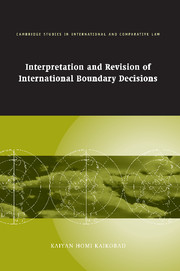Book contents
- Frontmatter
- Contents
- List of maps
- Preface
- Acknowledgments
- Table of cases
- List of abbreviations
- Part I Introduction
- Part II The settlement of territorial and boundary disputes
- Part III Judicial remedies: interpretation
- 3 The interpretation of judgments and awards
- 4 The classification of the notion of interpretation
- 5 Legal issues regarding interpretation
- 6 Principles of interpretation
- Part IV Judicial remedies: revision
- Part V Conclusions
- Select bibliography
- Index
- CAMBRIDGE STUDIES IN INTERNATIONAL AND COMPARATIVE LAW
4 - The classification of the notion of interpretation
Published online by Cambridge University Press: 14 September 2009
- Frontmatter
- Contents
- List of maps
- Preface
- Acknowledgments
- Table of cases
- List of abbreviations
- Part I Introduction
- Part II The settlement of territorial and boundary disputes
- Part III Judicial remedies: interpretation
- 3 The interpretation of judgments and awards
- 4 The classification of the notion of interpretation
- 5 Legal issues regarding interpretation
- 6 Principles of interpretation
- Part IV Judicial remedies: revision
- Part V Conclusions
- Select bibliography
- Index
- CAMBRIDGE STUDIES IN INTERNATIONAL AND COMPARATIVE LAW
Summary
Preliminary observations
The clarification sought by litigating States may range from a narrow point in a passage in the text of the award to wide-ranging issues arising from the original decision; this may and oftentimes does involve dealing with questions relating to the identification of geographical features described in the decision. Requests for interpretation may also raise issues regarding the effect of the decision on large tracts of territory, and the status thereof. The brief description provided above will have indicated that this study contemplates two kinds of interpretation, namely, incidental interpretation and main case interpretation. Both are examined individually below.
Interpretation as incidental to the main case
The first kind of interpretation is typical of the basic notion, namely, interpretation as a species of incidental jurisdiction. As such, it is a legal device which enables a State to request the tribunal which gave the decision to interpret its judgment or award in order to clarify aspects of the meaning and scope thereof. It is incidental in the sense that the interpretative process and subsequent decision is supplementary to the main proceedings and the judgment or arbitral award of the tribunal. It is also incidental in that the process springs either (a) from the basic arbitral agreement between the parties or (b) from a standing right vested in a permanent tribunal such as the International Court of Justice, the Court of Justice of the European Communities or the Court of Justice of the European Free Trade Area.
- Type
- Chapter
- Information
- Publisher: Cambridge University PressPrint publication year: 2007



